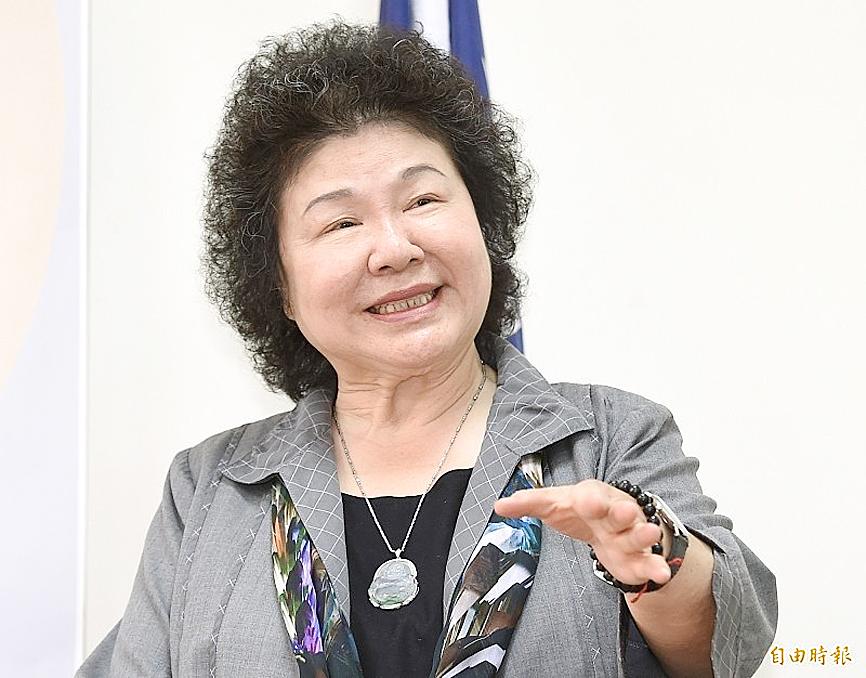Former Presidential Office secretary-general Chen Chu (陳菊) would likely focus her energy on running the new National Human Rights Committee when she takes over as Control Yuan president, another incoming member of the government watchdog said.
The source, who requested anonymity, said that the smooth transition of the Control Yuan’s powers to investigate, censure and audit should be ensured.
Chen has repeatedly said that she hoped to be the last Control Yuan president, amid calls for the watchdog to be abolished, although she has also said that she would perform all the duties that come with the title to the best of her ability.

Photo: Lee Hsin-fang, Taipei Times
President Tsai Ing-wen’s (蔡英文) administration last week said it would push for a constitutional amendment to abolish the Control Yuan and the Examination Yuan in the next legislative session that starts in September.
The legislature on Dec. 10 last year passed the Organic Act of the National Human Rights Committee (國家人權委員會組織法), paving the way for the establishment of a 10-member committee.
The new committee is different from the Control Yuan’s other seven standing committees, because it would be based on teamwork, rather than individual investigation, a Control Yuan member said on condition of anonymity.
Control Yuan members lead independent investigations before convening other members and presenting their results, after which those convened vote on whether to issue an impeachment, recall of officials or a corrective notice, the source said.
Such statements do not carry much weight, as they are attributed to the Control Yuan member or members who led the investigation, unless other members back the motion, the source said.
However, a Control Yuan member, or a member of the National Human Rights Committee’s standing committee can propose an issue that would be debated and rigorously reviewed before the rights committee decides to accept the case.
The Human Rights Committee is to have 10 members, including the Control Yuan president. Aside from Chen, seven more members have been confirmed, with the final two to be appointed from among current Control Yuan members.
Another member, also citing anonymity, said that should the constitutional amendment pass, incoming Control Yuan members must recognize they would be the last of a sunset organization.
They would leave their posts after overseeing a transition of power, another source said.
The second source said that it is of utmost importance that the incoming members ensure that the Human Rights Committee becomes an independent agency if the Control Yuan is abolished.
Whether the Legislative Yuan would assume the mantle of exercising the power of control of the Control Yuan and then adopt a bicameral system is still up for debate, the second source said.
The terms of the current Control Yuan members end on Friday, with the new members to assume their posts the following day.

The manufacture of the remaining 28 M1A2T Abrams tanks Taiwan purchased from the US has recently been completed, and they are expected to be delivered within the next one to two months, a source said yesterday. The Ministry of National Defense is arranging cargo ships to transport the tanks to Taiwan as soon as possible, said the source, who is familiar with the matter. The estimated arrival time ranges from late this month to early next month, the source said. The 28 Abrams tanks make up the third and final batch of a total of 108 tanks, valued at about NT$40.5 billion

Two Taiwanese prosecutors were questioned by Chinese security personnel at their hotel during a trip to China’s Henan Province this month, the Mainland Affairs Council (MAC) said yesterday. The officers had personal information on the prosecutors, including “when they were assigned to their posts, their work locations and job titles,” MAC Deputy Minister and spokesman Liang Wen-chieh (梁文傑) said. On top of asking about their agencies and positions, the officers also questioned the prosecutors about the Cross-Strait Joint Crime-Fighting and Judicial Mutual Assistance Agreement, a pact that serves as the framework for Taiwan-China cooperation on combating crime and providing judicial assistance, Liang

A group from the Taiwanese Designers in Australia association yesterday represented Taiwan at the Midsumma Pride March in Melbourne. The march, held in the St. Kilda suburb, is the city’s largest LGBTQIA+ parade and the flagship event of the annual Midsumma Festival. It attracted more than 45,000 spectators who supported the 400 groups and 10,000 marchers that participated this year, the association said. Taiwanese Designers said they organized a team to march for Taiwan this year, joining politicians, government agencies, professionals and community organizations in showing support for LGBTQIA+ people and diverse communities. As the first country in Asia to legalize same-sex

MOTIVES QUESTIONED The PLA considers Xi’s policies toward Taiwan to be driven by personal considerations rather than military assessment, the Epoch Times reports Chinese President Xi Jinping’s (習近平) latest purge of the Chinese People’s Liberation Army (PLA) leadership might have been prompted by the military’s opposition to plans of invading Taiwan, the Epoch Times said. The Chinese military opposes waging war against Taiwan by a large consensus, putting it at odds with Xi’s vision, the Falun Gong-affiliated daily said in a report on Thursday, citing anonymous sources with insight into the PLA’s inner workings. The opposition is not the opinion of a few generals, but a widely shared view among the PLA cadre, the Epoch Times cited them as saying. “Chinese forces know full well that